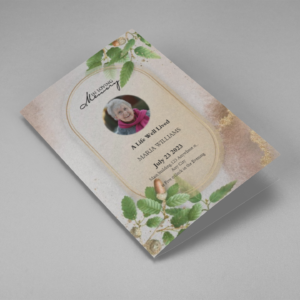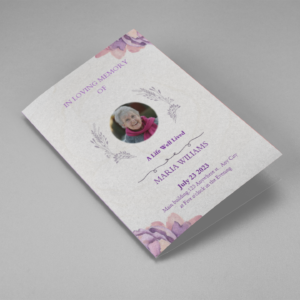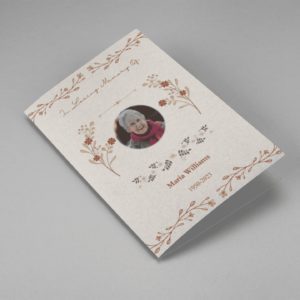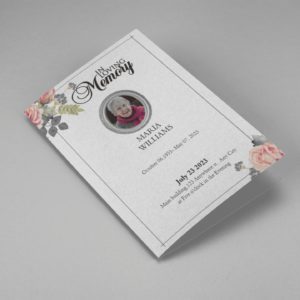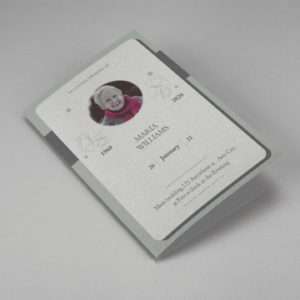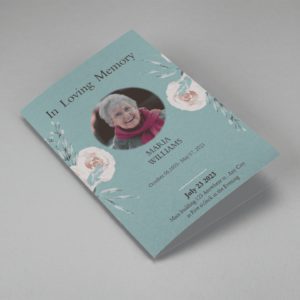Memorial cards for funerals, also known as remembrance or prayer cards, are small yet meaningful keepsakes that honor the life and memory of a loved one who has passed. These cards are often distributed during or after a funeral or memorial service and provide a lasting tribute that family and friends can cherish. Creating personalized remembrance cards is a thoughtful way to celebrate the life of the deceased and keep their memory alive.
Why Memorial Cards for Funerals Matter
Memorial cards serve multiple purposes beyond being a simple keepsake. They allow mourners to reflect on the life and legacy of the deceased, offering comfort and solace during the grieving process. Here are a few reasons why memorial cards hold such significance:
1. Personal Connection
A personalized memorial card helps mourners feel connected to the individual who has passed. By including meaningful quotes, verses, or images that represent the deceased’s personality, hobbies, or beliefs, you create a heartfelt tribute that feels authentic and personal.
2. Lasting Keepsake
Memorial cards offer a tangible way for family and friends to remember their loved one. These cards can be placed in photo albums, kept in wallets, or displayed in the home, serving as a constant reminder of the person’s impact on the lives they touched.
3. Spiritual Comfort
Many memorial cards include religious verses, prayers, or psalms that offer spiritual comfort to those grieving. For religious families, incorporating these elements provides a sense of peace and reflection during the mourning process.
4. Commemorative Gift
Memorial cards are a meaningful gift for attendees of a funeral or memorial service. These cards not only honor the deceased but also provide attendees with a lasting memento of the service and the person being remembered.
How to Create Personalized Remembrance Cards
Creating personalized memorial cards allows you to honor your loved one in a way that reflects their unique personality and life journey. Here’s how to get started:
1. Choose the Format
Memorial cards come in various formats, including single-sided cards, double-sided cards, folded cards, and bookmarks. The format you choose depends on how much information, imagery, and design elements you wish to include.
- Single-Sided Cards: Best for minimalist designs with a simple photo, name, and short message.
- Double-Sided Cards: Allow for additional content, such as a prayer on one side and a photo on the other.
- Folded Cards: Ideal for those who want to include multiple sections, such as an obituary, poem, and photos.
- Memorial Bookmarks: A unique option that can serve as both a keepsake and a practical item for daily use.
2. Gather Essential Information
The key to creating a memorable and meaningful memorial card is including personal details that celebrate the life of the deceased. Here are some key elements to consider including:
- Name of the deceased
- Date of birth and date of passing
- A meaningful quote, verse, or prayer
- A short biography or tribute
- An obituary or eulogy excerpt
- Photos of the deceased
- Service details (if applicable)
3. Select a Meaningful Design
The design of your remembrance card should reflect the personality and life of the deceased. For example, if your loved one was passionate about nature, you might choose a design featuring landscapes or floral elements. If they had a strong religious faith, including religious symbols such as crosses, angels, or doves can add a spiritual touch.
At QuickFuneral.com, you can choose from a wide selection of customizable memorial card templates. Our templates are easy to edit, allowing you to upload personal photos, modify text, and change colors to suit your needs.
4. Incorporate Personal Photos
Adding a photo of the deceased makes the memorial card more personal and impactful. Choose a high-quality, clear photo that captures the essence of your loved one. You can also include multiple photos, such as a recent image and one from their younger years, to highlight different stages of their life.
5. Craft a Meaningful Message
The message on the memorial card can vary depending on the deceased’s personality, values, and the tone you want to convey. Some common options include:
- Religious Prayers or Verses: For those with strong faith, including a prayer or scripture provides comfort.
- Poems: Funeral poems offer an emotional and reflective way to remember the deceased.
- Quotes: Choose a meaningful quote that reflects the values or life philosophy of your loved one.
- Personalized Message: Write a short tribute or a loving note from the family to express gratitude and love.
Once you’ve customized the design, it’s time to print the cards. Use high-quality card stock for a professional and durable finish. Memorial cards can be distributed during the funeral or mailed to family and friends who were unable to attend the service.
Types of Memorial Cards for Funerals
Memorial cards come in various types and styles, each suited to different preferences and needs. Below are some popular options to consider:
1. Traditional Memorial Cards
These are typically 2.5 x 4.25-inch cards with the name of the deceased, dates, a prayer or poem, and an image. They are simple and straightforward, offering a classic way to honor the deceased.
2. Memorial Prayer Cards
Prayer cards include a religious prayer or verse on one side and the photo and name of the deceased on the other. They are popular for religious services and provide spiritual comfort to attendees.
3. Memorial Bookmarks
Bookmarks are a unique option for memorial cards. They can feature a photo of the deceased, a quote or prayer, and a small timeline of their life. Memorial bookmarks are practical and can be used daily by family and friends.
4. Bi-Fold Memorial Cards
Bi-fold cards allow for more space to include detailed information, such as an obituary, service details, photos, and a personal message. These cards are ideal for families who want to include multiple elements.
Design Tips for Creating Beautiful Memorial Cards
When designing a memorial card, it’s important to strike a balance between personalization and elegance. Here are some tips to guide you through the process:
1. Keep the Design Simple
While it’s tempting to include a lot of information, keeping the design clean and uncluttered will make it more visually appealing. Focus on the most important elements, such as the photo, name, and a short message.
2. Use High-Quality Images
Ensure that any photos you use are high-resolution and clear. Blurry or pixelated images will detract from the overall appearance of the card.
3. Choose Elegant Fonts
Opt for easy-to-read fonts that complement the tone of the card. For a classic look, serif fonts work well, while script fonts add a more personal touch.
4. Match Colors with the Tone
The color palette should reflect the tone of the service and the personality of the deceased. Soft, muted colors work well for traditional services, while brighter colors can be used for celebrations of life.
Memorial Templates
-
Searching for a Oak Leaf With Gold Oval Frame Half Page Funeral Program that is easy to print and amass and has a cutting-edge look? The Oak Leaf With Gold Oval Frame Half Page Funeral Program is the Perfect decision because it measures 8.5”x 5.5”.
- No Limitation on Content, Edit anything
- Edit anytime – unlimited revisions even after purchased
- Get a printable PDF downloaded to get it printed on your own.
-
Searching for a Brown and White Classic Funeral Program Half Page Program that is easy to print and amass and has a cutting-edge look? The Brown and White Classic Funeral Program Half Page Program is the Perfect decision because it measures 8.5”x 5.5”.
- No Limitation on Content, Edit anything
- Edit anytime – unlimited revisions even after purchased
- Get a printable PDF downloaded to get it printed on your own.
-
Searching for a Purple Elegant Watercolor Half Page Funeral Program Template that is easy to print and amass and has a cutting-edge look? The Purple Elegant Watercolor Half Page Funeral Program Template is the Perfect decision because it measures 8.5”x 5.5”.
- No Limitation on Content, Edit anything
- Edit anytime – unlimited revisions even after purchased
- Get a printable PDF downloaded to get it printed on your own.
-
Searching for a Cream and Green Photo Obituary Half Page Program that is easy to print and amass and has a cutting-edge look? The Cream and Green Photo Obituary Half Page Program is the Perfect decision because it measures 8.5”x 5.5”.
- No Limitation on Content, Edit anything
- Edit anytime – unlimited revisions even after purchased
- Get a printable PDF downloaded to get it printed on your own.
-
Searching for a Cream Simple Elegant Photo Church Half Page Program that is easy to print and amass and has a cutting-edge look? The Cream Simple Elegant Photo Church Half Page Program is the Perfect decision because it measures 8.5”x 5.5”.
- No Limitation on Content, Edit anything
- Edit anytime – unlimited revisions even after purchased
- Get a printable PDF downloaded to get it printed on your own.
-
Searching for a Samovar Silver Half Page Funeral Program Template that is easy to print and amass and has a cutting-edge look? The Samovar Silver Half Page Funeral Program Template is the Perfect decision because it measures 8.5”x 5.5”.
- No Limitation on Content, Edit anything
- Edit anytime – unlimited revisions even after purchased
- Get a printable PDF downloaded to get it printed on your own.
-
Searching for an Elegant Beige Half Page Funeral Program Template that is easy to print and amass and has a cutting-edge look? The Elegant Beige Half-Page Funeral Program Template is the Perfect decision because it measures 8.5”x 5.5”.
- No Limitation on Content, Edit anything
- Edit anytime – unlimited revisions even after purchased
- Get a printable PDF downloaded to get it printed on your own.
-
Searching for a White Floral Pro Half Page Funeral Program Template that is easy to print and amass and has a cutting-edge look? White Floral Pro Half Page Funeral Program Template is the Perfect decision because it measures 8.5”x 5.5”.
- No Limitation on Content, Edit anything
- Edit anytime – unlimited revisions even after purchased
- Get a printable PDF downloaded to get it printed on your own.
-
Searching for a Grey and Burgundy Elegant Half Page Funeral Program Template that is easy to print and amass and has a cutting-edge look? Grey and Burgundy Elegant Half Page Funeral Program Template is the Perfect decision because it measures 8.5”x 5.5”.
- No Limitation on Content, Edit anything
- Edit anytime – unlimited revisions even after purchased
- Get a printable PDF downloaded to get it printed on your own.
-
Searching for a Soft Green and Grey Minimalist Floral Half Page Funeral Program Template that is easy to print and amass and has a cutting-edge look? Soft Green and Grey Minimalist Floral Half Page Funeral Program Template is the Perfect decision because it measures 8.5”x 5.5”.
- No Limitation on Content, Edit anything
- Edit anytime – unlimited revisions even after purchased
- Get a printable PDF downloaded to get it printed on your own.
-
Searching for a Gray Elegant Oval Frame Half Page Funeral Program Template that is easy to print and amass and has a cutting-edge look? Gray Elegant Oval Frame Half Page Funeral Program Template is the Perfect decision because it measures 8.5”x 5.5”.
- No Limitation on Content, Edit anything
- Edit anytime – unlimited revisions even after purchased
- Get a printable PDF downloaded to get it printed on your own.
-
Searching for a Blue Organic Minimal Half Page Funeral Program Template that is easy to print and amass and has a cutting-edge look? Blue Organic Minimal Half Page Funeral Program Template is the Perfect decision because it measures 8.5”x 5.5”.
- No Limitation on Content, Edit anything
- Edit anytime – unlimited revisions even after purchased
- Get a printable PDF downloaded to get it printed on your own.
-
Searching for a Pink and Orange Watercolour Half Page Funeral Program Template that is easy to print and amass and has a cutting-edge look? Pink and Orange Watercolour Half Page Funeral Program Template is the Perfect decision because it measures 8.5”x 5.5”.
- No Limitation on Content, Edit anything
- Edit anytime – unlimited revisions even after purchased
- Get a printable PDF downloaded to get it printed on your own.
-
Searching for a Pink Floral Paper Half Page Funeral Program Template that is easy to print and amass and has a cutting-edge look? Pink Floral Paper Half Page Funeral Program Template is the Perfect decision because it measures 8.5”x 5.5”.
- No Limitation on Content, Edit anything
- Edit anytime – unlimited revisions even after purchased
- Get a printable PDF downloaded to get it printed on your own.


